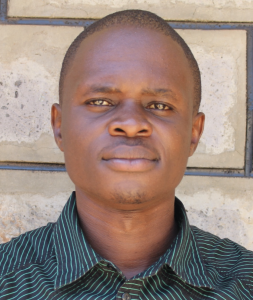Please note, original photos were taken before the pandemic.
We visited Friends Musiri Primary School on a cold morning; it had rained heavily on the previous night. The school is located in a rural area which is peaceful. The only noise that could be heard was that of a maize grinding machine in the distance.
Friends Musiri Primary School was established in 1974 by the Friends Quakers Church. The school has been able to register an above-average performance over the years, and currently boasts of 387 students and 11 teachers and staff.
But the only source of water on campus is a small plastic rain tank which holds just a few thousand liters of water. This tank's water is reserved for the school kitchen's use, but it frequently and often runs dry. Ther is no other source to provide water for the rest of the school's drinking, cleaning, and sanitation needs like handwashing. So, students have to bring water from home to school every day of the year.
"I had been contemplating seeking a transfer from this school, but it's only last year that we were supported with a 10,000-liters plastic tank," said Deputy Headteacher Milton Bandi.
"We restricted the pupils from accessing the water because it would not be enough, but this just doesn't feel right because the pupils' welfare should come first. During the dry season, we all end up depending on the water that is brought in by the pupils from home and this makes the pupils to bring in twice as much water than usual."
Pupils arrive in the school carrying water and their books by 7:00 am every day. This first round of water is used for cleaning the toilets, cooking the Class 8 pupils' lunch, and for the children to drink during break times. On Fridays, the pupils have to come back with water in the afternoon for cleaning the classrooms. Most Friday afternoons are spent on cleaning because the pupils become too sluggish to come back to school after lunch knowing the heavy task that is ahead of them. Some simply don't return, leaving the rest of their classmates to make up for their absence with less water and more work.
In the evenings when the pupils go home, they have to fetch water for domestic use and an extra jerrycan is kept aside to be carried to school the following day. This means most of the pupils lack time to study at home and do their homework. The mornings are also hectic because they have to walk slowly to school with heavy jerrycans of water and this makes them arrive late.
We accompanied some of the students home to see where they fetch water. One of the containers spotted in a nearby home where a pupil regularly fetches water was extremely dirty. This was a clear indication that the water in it could not be free from bacteria. Pupils' jerrycans were also very dirty, leading to the conclusion that the water was also not safe for human consumption. Even clean water can be contaminated by dirty containers or hands dipped inside as the students try to balance their containers and books with a better grip.
Because students' water is combined for use at school, even 1 contaminated source means everyone is at risk of water-related diseases. A lot of absenteeism is registered by class teachers, especially during the dry season. The pupils often complain of stomachache and general weakness or fatigue. This is due to the increased thirst levels which forces the pupils to drink more of the water that they bring to school from various unknown sources.
"As an administrator who is personally answerable for this school, I cringe every morning at the thought of a possible waterborne disease outbreak in my school. I never have a settled mind concerning the water crisis in the school," said Headteacher Charles Anyala.
We talked to students about their water situation at school too, but most pupils were very shy and just smiled when we asked about their challenges; they consider fetching water as a normal part of school activities, and they did not want to be caught complaining.
What We Can Do:
Rain Tank
A 75,000-liter rainwater catchment tank will help alleviate the water crisis at this school. The school will help collect the needed construction materials such as sand, bricks, rocks, and water for mixing cement. We will complement their materials by providing an expert team of artisans, tools, hardware, and the guttering system. Once finished, this tank will begin catching rainfall that will be used by the school’s students and staff for drinking, handwashing, cooking, cleaning, and much more.
We and the school strongly believe that all of these components will work together to improve standards at this school, which will help lead to better student academic performance and will help to unlock the potential for these students to live better, healthier lives.
Handwashing Stations
There is currently nowhere for students to wash their hands after using the latrines or before eating lunch, let alone the water to do so.
The student health club will oversee the 2 new handwashing stations we will provide, and make sure they are kept clean and in working condition. The club leaders will fill the handwashing stations with water daily and make sure they are always supplied with a cleaning agent such as soap or ash.
VIP Latrines
2 triple-door latrine blocks will be constructed with local materials that the school will help gather. 3 doors will serve the girls while the other 3 will serve the boys. All of these new latrines will have cement floors that are designed to be easy to use and to clean. And with a rain tank right on school property, there should be enough water to keep them clean.
Training on Health, Hygiene, COVID-19, and More
We will hold a 1-day intensive training session with students, teachers, and parents. This training will cover a wide range of topics including COVID-19 symptoms, transmission routes, and prevention; personal and environmental hygiene; and the operation and maintenance of the rain tank, latrines, and handwashing stations. There will be a special emphasis on handwashing.
Our team of facilitators will use a variety of methods to train, including participatory hygiene and sanitation transformation, and asset-based community development. We will initiate a student health club, which will prepare students to lead other pupils into healthy habits at school and at home. We will also lead lectures, group discussions, and provide illustrative handouts to teach health topics and ways to promote good hygiene practices within the school including handwashing and water treatment. We will then conduct a series of follow-up trainings before transitioning to our regularly scheduled support visits throughout the year.



 Rehabilitation Project
Rehabilitation Project

















































